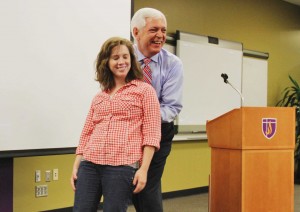Phil Williams is no liar.
He is an award-winning investigative reporter who always seeks to tell the truth.
“You never can tell who’s telling the truth and who’s telling you a lie unless you’re willing to do the hard work of testing it,” Williams said to a group of communication students at Lipscomb’s first Media Masters event of the school year.
To illustrate the mindset of an investigative reporter, Williams called on a volunteer from the audience to close their eyes and do the trust test with him.
“All of your life you’ve been told ‘learn to trust people.’
“Well, the mindset of an investigative reporter is ‘trust no one.'”
Williams discovered early on that a journalist should always be a truth seeker, constantly seeking not just an answer, but a truthful answer.
“With a lot of people that you will interview as a journalist, telling the truth is not exactly what they have in mind. They want to put their spin on the truth rather than just coming out and acknowledging it.”
“We live in a world where truth isn’t always the best defense because sometimes a lie is much more powerful.”
When working on investigative work, Williams suggests to first determine the truth if possible. If the truth cannot be supported with proper evidence, Williams explains that it is always best to give both sides of the story.
“I think you have to deliberately put your biases and suspicions aside to tell the truth as much as you can.
“I have great faith in the public to decide for themselves to decide if someone’s telling the truth or not.”
Earning three duPont-Columbia Awards and three George Foster Peabody Awards, Williams has had his fair share of detecting what’s true and what’s false.
“As you embark upon your careers, let me just challenge you to think just because someone says something, you don’t have to report it as being true.”
Williams’ investigative reporting has taken him through many different experiences, but through it all he keeps two things in mind: the truth and the viewer.
“It’s important as you start your careers as journalists to remember who you work for. You work for the viewer, you work for the reader.”


